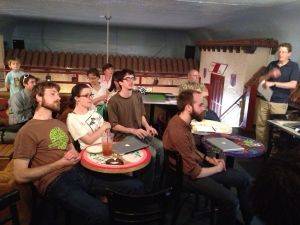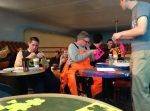Scientists are accountable to the public — we are funded by you and you deserve to hear why our research is important and the ways it impacts our everyday lives. Further, we are excited about our research and want you to be, too!
 What makes an idea like Science Café so great is that it allows scientists to interact with the public in a relaxed way, answering questions and fostering a dialogue. The goals of Science Café are to make science approachable to members of the community, and to improve community involvement with their universities.
What makes an idea like Science Café so great is that it allows scientists to interact with the public in a relaxed way, answering questions and fostering a dialogue. The goals of Science Café are to make science approachable to members of the community, and to improve community involvement with their universities.
Science Café was an idea that started in Boston and has grown to a worldwide organization sponsored by NOVA, NSF, HHMI, and the Alfred P. Sloan Foundation. The scientific community is a global community, and Science Café is no exception — the debut of Science Café in Pakistan, for example, occurred one year ago this September. In fact, Pakistan was debuting at the same time Science Café came to Chambana! Science Café got its start in our town when co-founder Joe Toscana, who was involved in the Iowa City chapter, wanted to feel a similar connection here. So he collaborated with Jess Love, a fellow researcher at the time, to start up our own group.
 Since starting last September, Science Café holds monthly meetings covering mathematics, breast cancer diagnoses, nature and the environment, plant root systems, language, and more. Don’t think of Science Café as just a lecture about research; these are interactive conversations between the audience and the presenter, and all ages are welcome.
Since starting last September, Science Café holds monthly meetings covering mathematics, breast cancer diagnoses, nature and the environment, plant root systems, language, and more. Don’t think of Science Café as just a lecture about research; these are interactive conversations between the audience and the presenter, and all ages are welcome.
This year’s lineup promises to be equally interesting and just as diverse. The first meeting following the summer hiatus will be held September 4th at 5:30pm in their new location at the Robeson Pavilion C, at the Champaign Public Library. Meetings are held at 5:30pm on the first Wednesday of every month, and last for one hour. The first presenter of the year is Bryan White, who will be discussing the importance of the microbiome in human health and disease. To prepare you could read up on fecal transplants before you go to have a handful of questions in the bag, so to speak! Future interactions will cover automatic speech recognition, x-ray crystallography (allowing you to visualize individual atoms!), and social network analyses.
For more information and to keep in the know visit the Chambana Science Café’s Facebook page, sign up for emails on their listserv, or follow them on Twitter @ChambanaSciCafe. Hope to see you there!
Article co-written by Rhiannon Peery and Laura Stein. Images courtesy of Joe Toscana.








